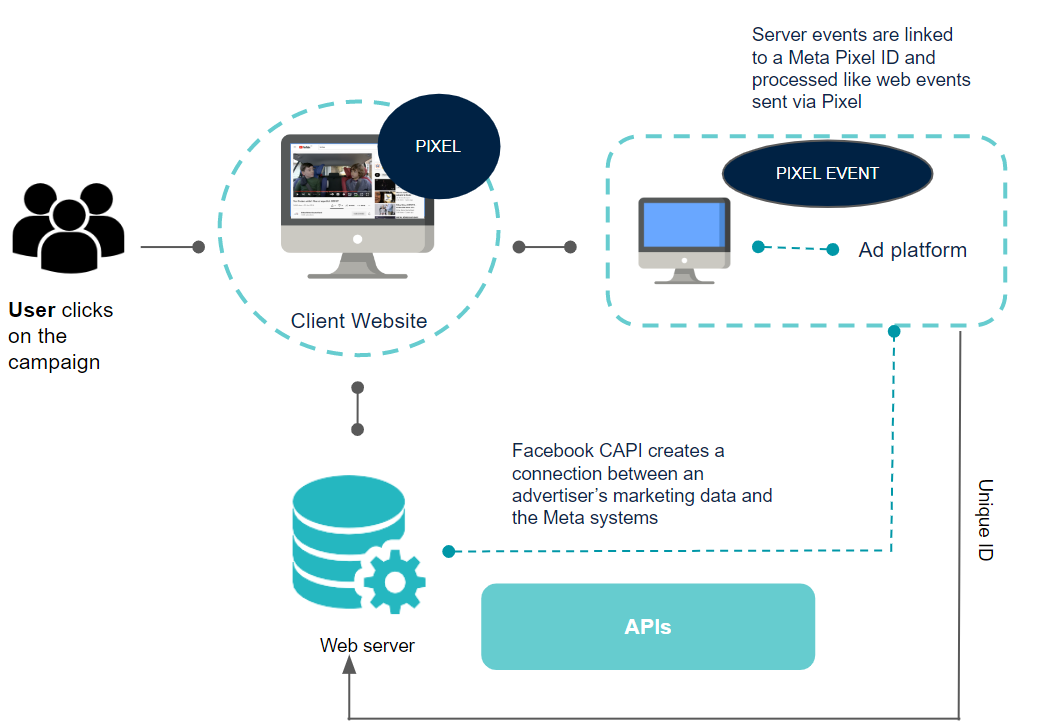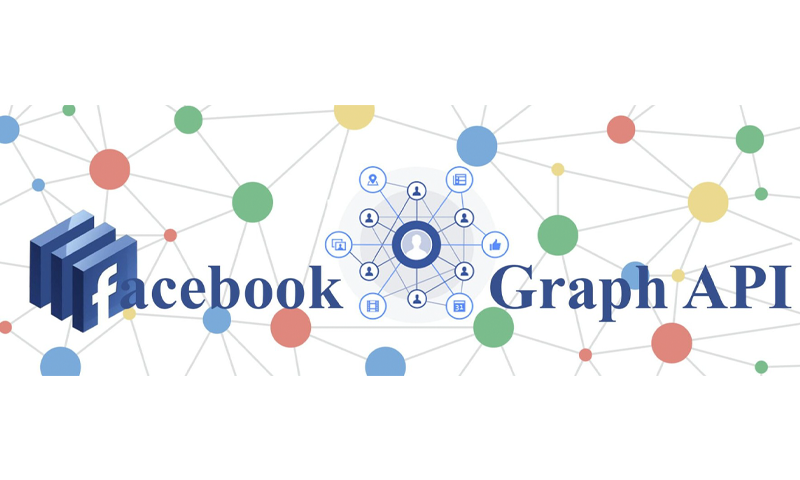Since there have been lots of changes in terms of privacy regulations recently, organizations are forced to comply with new standards and adjust the way they operate continuously.
In a world where privacy concerns and data protection are increasingly gaining importance, we as marketers face several challenges. The introduction of new privacy and data regulations implies a need for organisations to constantly adapt to change. For instance, in the eyes of several privacy updates, valuable cookie-based data tracking solutions such as the Facebook Pixel become worthless. This is due the inability of the Facebook Pixel to continue tracking consumers in the near future resulting in the loss of valuable data. Solutions such as Facebook’s Conversions API (Facebook CAPI) offer a promising alternative to the Facebook Pixel and should be implemented by organisations as soon as possible to continue to optimise advertising on Meta and ultimately increase sales.
Facebook’s Conversions API Integration is a “must have” due to profound challenges
Since there have been lots of changes in terms of privacy regulations recently, organisations are forced to comply with new standards and adjust the way they operate continuously. Some lines of business are specifically affected, such as data-driven marketing, due to its incremental reliance on data.Thus, we face four main challenges that affect the way we can track and use our audience data for marketing purposes:
1. Data protection initiatives are increasingly put in place:
Regulations, such as GDPR, are being implemented and urging organisations to review and update the way they collect and use data, as well as the transparency and control they provide consumers over how their data is used. As a more implicit result, organisations such as Apple and Microsoft also continuously adjust their operating systems, which directly affect us marketers in the way we can track consumers and continue collecting data.Thus, we as marketers should find ways to be as cautious about our customers’ data as possible and market the organisation as a pioneer in terms of data protection initiatives.
2. Device manufacturers are changing their operating system protocols:
Everyone who placed ads on Facebook will have noticed that the launch of Apple’s iOS-14 with its opt-in rules had a big influence on ad performance. Changes by Apple, for instance, included that Apple users now need to actively give permission to be tracked across apps and websites, leading to a decrease in data signals. Furthermore, data for optimization must also now pass through an Apple server (SkadNetwork) that serves as a catalyst to restrict and aggregate data before sending it to advertising platforms. This process leads to a 24 to 48 hour processing delay. We can expect more changes like these from device manufacturers to take place and impact our business in the future.
3. People increasingly demand data protection and make use of ad blockers:
Users are increasingly demanding privacy protection and can take action to enhance it, such as through the use of ad blockers. Ad blockers do not only lead to hindering the exposure of ads and thus the inability for us to target these people, but also to the inability to send information from websites back to Meta via the Facebook Pixel. This means that lots of valuable data potentially gets lost.
4. We will live in a Cookieless Future:
3P Cookies will be blocked on default by all major browser providers such as Chrome and Safari, as new regulations are enacted. The timely diminishing of 3P Cookies leads to problems in the way the traditional Facebook Pixel works and remains useful for organisations. This is due to the role Cookies play for the Facebook Pixel: Through Cookies, data can be saved in the user’s browser that is then sent to Meta. Hence, without these Cookies, data cannot be saved in the user’s browser anymore, and therefore, the Facebook Pixel, which is reliant on the user’s browser information, cannot send any data back to Meta.
The benefits of the Facebook’s Conversions API
Due to the above-mentioned profound challenges, the Facebook Pixel is going to lose in significance for us marketers until there will be no more use for the Pixel at all. Therefore, marketers and organisations urgently need to look for alternatives. One such alternative is Facebook’s CAPI, which is considered to be a server-sided tool.
Independence from Third-Party Cookies:
For those that already heard about Facebook’s CAPI, it might seem to work similarly to the Facebook Pixel at first glance, but the key difference is the way data is transmitted: Instead of making use of a Javascript code for tracking user activity and sending web events and conversion data through a web browser, Facebook’s CAPI transfers the data via the server without the use of 3P cookies. As can be seen in Figure 1, when a user now clicks on a Facebook ad, Meta will send a unique ID for that user to the server. The server, in turn, will track the user’s actions via the unique ID and note if the user completes a specific action such as making a purchase or adding a product to their shopping card. This information subsequently is sent to Meta, telling Meta which actions the user with the unique ID undertook. Therefore, Facebook’s Conversions API lets you share web events directly from your server and sends corresponding tracking data (link identifiers) and events to Meta. Within this process, data from your server is matched, then received data points are assigned to the according Facebook profile. This solution helps to increase the quality of conversions that are tracked online and offline by using a server connection and creates ways to overcome the issue of changing operating system protocols such as IOS-14, as the data collection process does not depend on Cookies anymore. Hence, limitations of device manufacturers in terms of the ability to collect through client-side (pixel) tracking can also be overcome.

Figure 1: Illustration of the operating principle of Facebook’s Conversions API.
Increased data control:
Through the use of Facebook’s CAPI, marketers and organisations can further benefit from discrete data control, as through the implementation of Facebook’s CAPI organisations can decide what data they would like to share with Meta. Compared to the basic Facebook Pixel that tracks everything visitors do on the websites by default, Facebook’s CAPI allows for more nuanced settings in terms of what data can be tracked and shared with Meta. To extract more data control, Meta lets you choose to append insights to your events and decide if you would like to share data, such as product margins, when setting up Facebook’s CAPI. In that regard, organisations are better able to comply with data protection laws and please customers who demand data protection, thus enhancing a more favourable image of the organisation. Moreover, the enhanced control over data transmission also allows organisations to be more flexible and add valuable business information, such as customer value, CRM data, and qualified leads, to Meta. This allows for increased ad optimization opportunities and greater insights.
Not Dependent on Websites with a Log-In Function or a CRM Database:
Besides offering answers to the above-mentioned challenges, Facebook’s CAPI also offers additional advantages. For instance, Facebook’s CAPI also works for websites that do not have a log-in function or organisations without a CRM database. That makes Facebook’s CAPI superior to other alternatives, such as Adobe’s People-Based-Destinations solution. Adobe’s People-Based-Destination is an application (subject to charge) for the segmentation of online and offline data that creates audience segments based on hashed identifiers (email addresses) and also works in a cookie-less environment.However, a clear disadvantage of Adobe’s solution is its dependence on people-based identifiers, especially users’ email addresses, since it only works with log-in or CRM data that provide this information. In contrast, Facebook’s CAPI can make use of other data keys, such as browser ID and IP address, which can be known without any sign in or sign up activity. Thus, the CAPI is not dependent on the same information.
Higher Reliability & Removal of Processing Burden:
Furthermore, Facebook’s Conversion API is considered to be more reliable than the Facebook Pixel, as it is not prone to client-side issues, such as tracking errors that, for example, are due to a user leaving the page before the pixel fires or an interrupted connection. Currently, connectivity issues and web browser loading errors are leading to diminishing quality of the amount of data that can be collected by organisations.However, this can be avoided by the deployment of Facebook’s CAPI. Additionally, sinceFacebook’s CAPI is server-sided, the user’s browser no longer needs to load tracking scripts. Thusthe processing burden from a client’s device can be removed, which leads to increased device performance. Therefore, customer experience and satisfaction can be improved.
Conclusion about Facebook’s Conversions API
Organisations that continue to rely on the Facebook Pixel will increasingly face problems with diminishing data that can be collected. This will lead to decreased optimization and tracking opportunities, which negatively impacts marketing performance. Facebook’s CAPI is effective when it comes to dealing with these challenges. In the eyes of new privacy regulations and increased customer demand for privacy,Facebook’s CAPI allows for increased data protection, due to enhanced data control. Furthermore, due to its server-side nature, it creates a way to bypass the issues of current or upcoming changing operating systems, the deployment of ad blockers on part of the consumers, and the challenge of a cookieless future. Therefore, for organisations, Facebook’s CAPI implementation should not remain a question of “Should I do it?” but rather of “How should I do it?”. It will come as no surprise that there are several different ways Facebook’s CAPI can be implemented that provide different advantages.
A set of questions that impact how your organisation should implement the Facebook CAPI include:
Based on the answers there are different implementation options that make the most sense for your organisation. We at Artefact cannot only help you find the best option based on your needs, but can also help you implement Facebook’s Conversions API in the best way possible.

 BLOG
BLOG






